Gumroad, a popular e-commerce platform, serves a significant user base with its feature-rich offerings.
Despite its advantages, Gumroad’s transaction fees and support limitations can challenge high-volume sellers.
And that is why sellers often find themselves needing an alternative that suits their requirements and helps them grow in the future without any roadblocks.
This article will explore top Gumroad alternatives to help creators diversify their sales channels and reach a wider audience.
But, let’s get started with the basics first.
What is Gumroad?
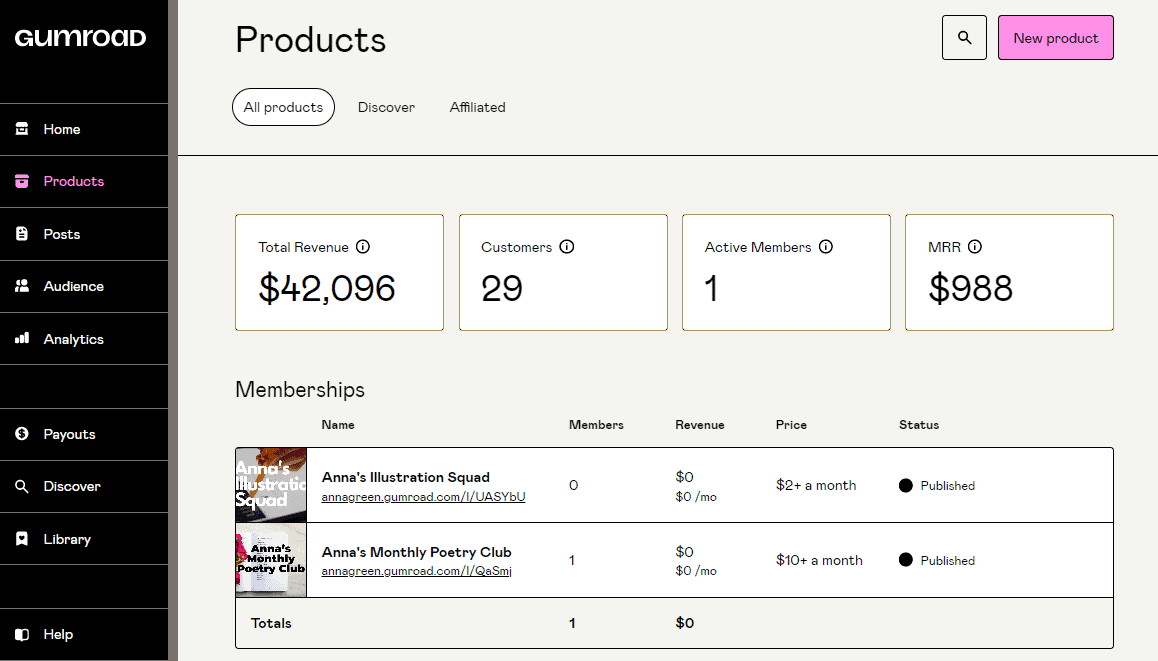
Gumroad is a simple e-commerce platform that allows users to set up personalized storefronts.
This helps creators showcase their ebooks, courses, software, artwork, and more and establish brand identity.
Users can customize their stores with designs, logos, and elements to make them more professional.
It also eliminates the need for a third-party hosting service, simplifies the entire process of managing, and delivers digital files to customers safely.
It also supports various payment methods, enabling creators to get the payments directly into the bank.
Overall, Gumroad offers a robust solution that empowers creators and provides a seamless shopping experience for customers.
Gumroad: Pricing and plans
Gumroad price includes two components: a transaction fee, and a payment processing fee.
Gumroad charges a flat 10% transaction fee on the sale price of each product sold. This percentage decreases as your sales grow.
It also charges a payment processing fee of 3.49%+$0.49 per transaction in the USA.
The charges differ from different payment platforms. You can check more details here.
Gumroad: Advantages and disadvantages
Gumroad has several advantages as well as some disadvantages.
Let’s discuss them all:
Advantages
- Gumroad provides an intuitive platform that is easy to set up and navigate, catering to creators of varying tech proficiency levels.
- Creators can effortlessly list their products, customize storefronts, and start selling digital goods within minutes.
- The platform securely handles payment processing, ensuring customer data safety and prompt payment to creators.
- Users can personalize their storefronts with branding elements like logos, colors, and fonts.
- It also offers moderate-level analytics, including sales performance and customer behavior insights, enabling data-driven decisions to optimize sales strategies.
Disadvantages
- Gumroad imposes transaction fees on each sale, potentially reducing the creator’s profit, particularly for high-volume sellers.
- It also has limited customization features compared to other e-commerce solutions.
- Gumroad primarily focuses on digital products, which may not be suitable for sellers looking to market physical products.
- High competition on Gumroad may necessitate additional marketing efforts to attract customers.
- Users need to rely on third-party tools and services for additional functionality, potentially leading to various issues over time.
Now, just like Gumroad, every other platform has some pros and cons.
Hence, before transitioning to a Gumroad alternative, thoroughly analyze both your business requirements and the capabilities of the platform.
Now, let’s walk you through the Gumroad competitors and alternatives.
5 best Gumroad alternatives for your online business
Here are the best Gumroad competitors for your online business.
Shopify
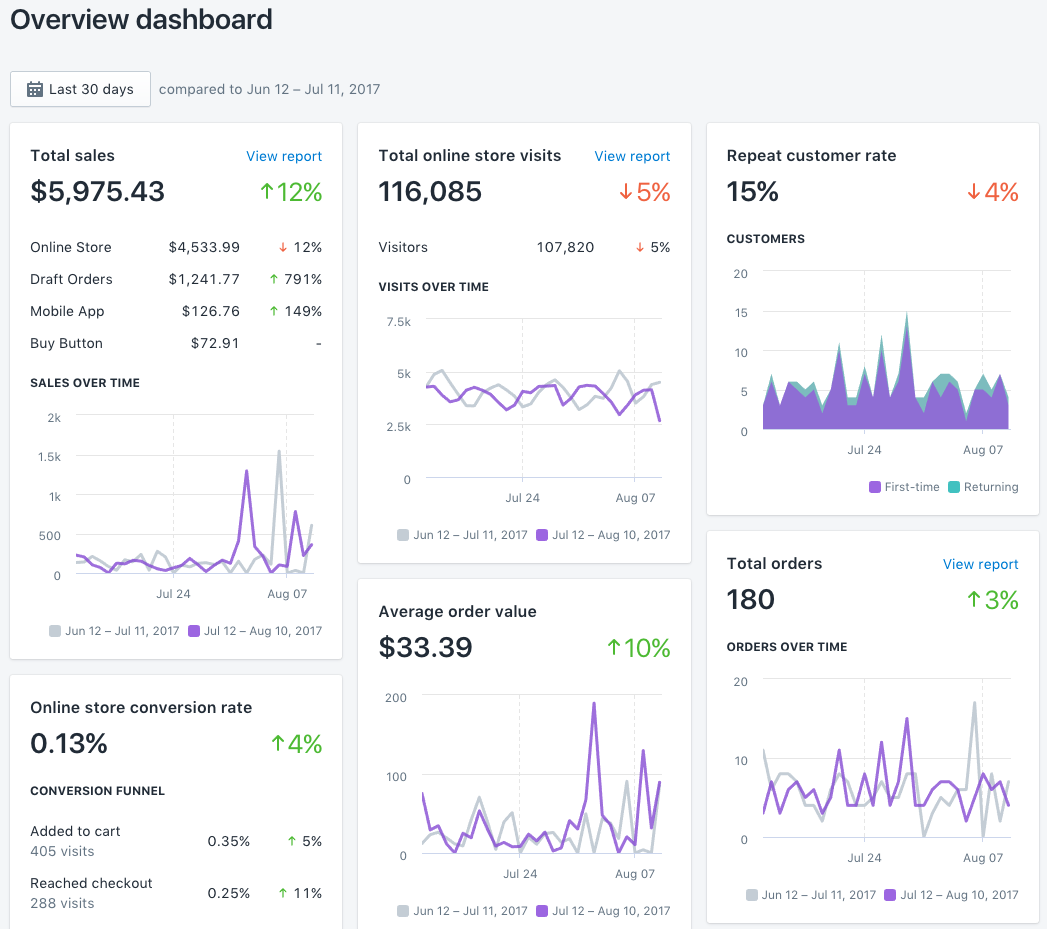
Shopify is a comprehensive e-commerce platform that allows you to create and customize your online stores. It offers multiple features that assist you in managing your store.
Key Features
- User-friendly interface for setting up and managing an online store
- Multiple sales channels including social media platforms and marketplaces
- Wide range of customizable templates/themes
- Built-in blog software for content creation
- Content management system for creating web pages and blog posts
Pros
- Mobile-responsive themes, ensuring seamless browsing experiences
- Scalability catering to businesses of all sizes
- Seamless integration with third-party apps
- Reliable hosting with robust security features like PCI compliance and SSL encryption
- Supports multiple languages, currencies, and international shipping options
Cons
- Additional charges may apply for most third-party integrations
How much does Shopify cost?
Shopify has different pricing plans for everyone:
- Basic: $29 per month
- Shopify: $79 per month
- Advanced: $299 per month
Additionally, transaction fees of 2.9% + $0.30 apply.
BigCommerce
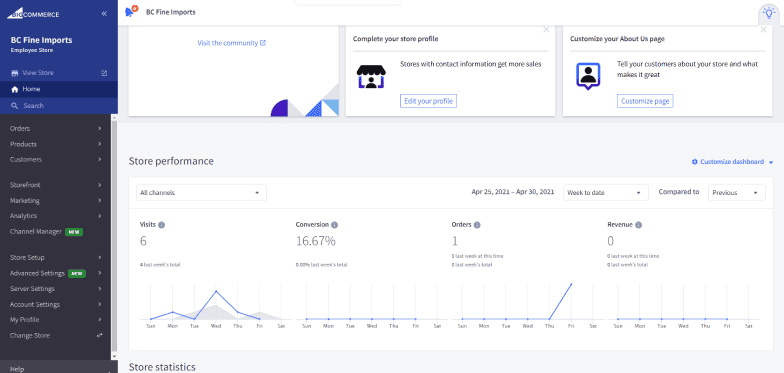
Bigcommerce is another popular e-commerce platform with robust features and scalability options.
Users can easily build online stores and connect multiple inventory locations to sell unlimited products.
Key Features
- Fully customizable storefront designs and templates
- Comes with built-in SEO tools
- Integrated payment gateways and multi-channel selling
- Advanced analytics and reporting tools
- Easy to navigate product library and inventory management
- Supports multiple languages, currency, cross border shipping, and prices powerful CDN
Pros
- Range of integrated marketing tools
- Flexible product management
- Responsive customer support
- Mobile responsive themes
- Highly secure and reliable e-commerce platform
Cons
- Limited selection of free templates
- Annual review limits on plans
How much does BigCommerce cost?
Bigcommerce has different pricing plans (billed monthly) for everyone:
- Standard: $39 per month
- Plus: $105 per month
- Pro: $399 per month
- Enterprise: quote based.
WooCommerce
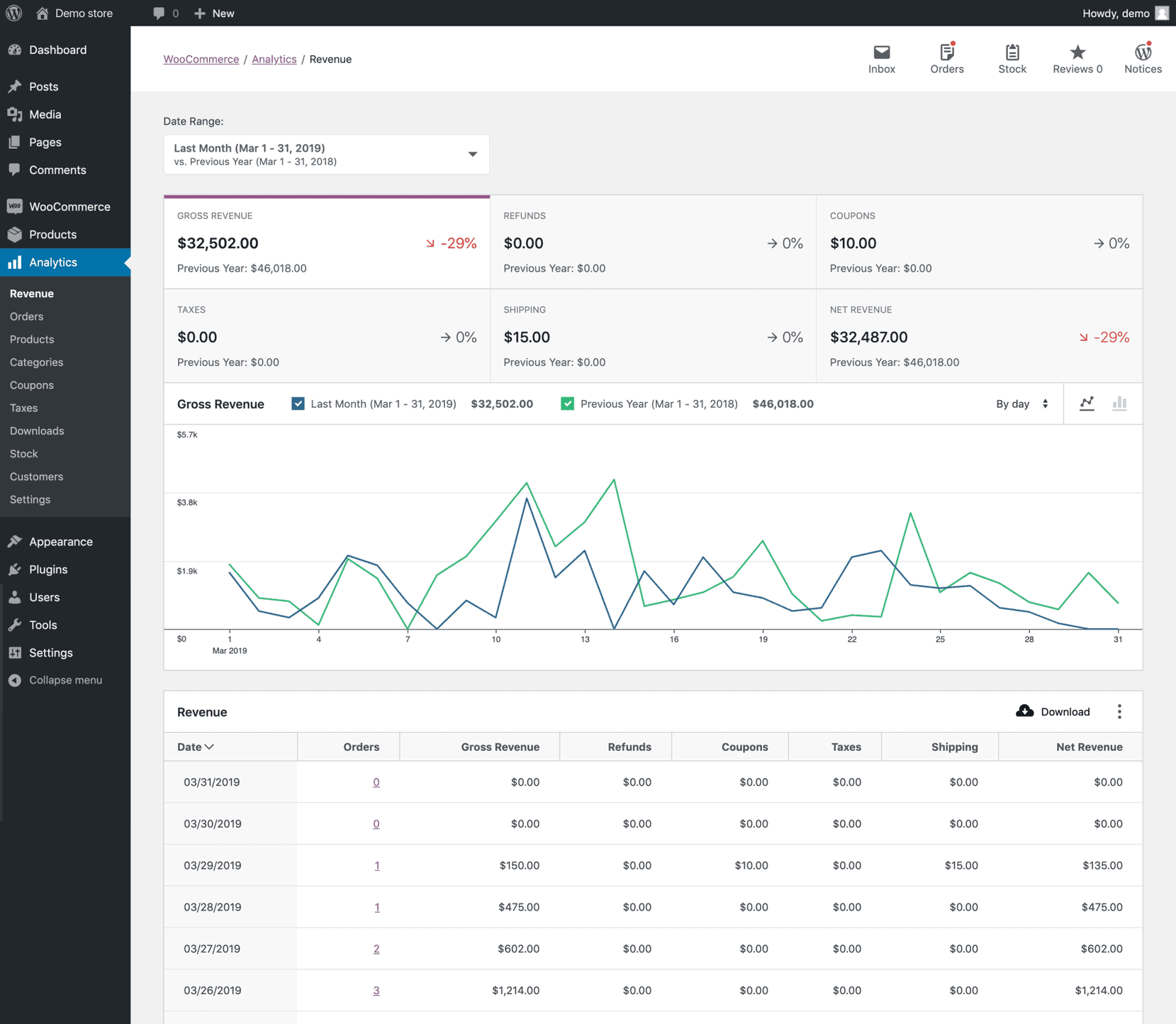
WooCommerce is one of the most popular e-commerce plugins for WordPress websites. It offers a flexible and customizable solution for your online store.
Key Features
- Seamless integration with WordPress
- Highly customizable themes and plugins
- Built-in payment gateways like Paypal, Square, Amazon Pay, Stripe, etc.
- Built-in blogging features
- Wide range of inventory management features
- Customized reporting capabilities
Pros
- Cost-effective option as it is free to use
- Provides complete flexibility and control over your store
- Highly scalable and grows with your business
- Integrate seamlessly with third-party services
Cons
- Limited support options
- Requires regular maintenance and security updates
- It can integrated with other CMS platforms but with limitations
How much does WooCommerce cost?
While WooCommerce itself is free to use, there are other expenses to consider:
- Hosting cost: Ranges from as low as $3.99 to as high as $5000 per month
- Domain cost: Around $15 per year
- Theme cost: The theme is usually free, but paid themes can range from $20 to $100 per year
- Transaction fee: Woocommerce doesn’t change any monthly fees. It charges transaction fees that are 2.9%+$0.30 for the USA. Payment for other gateways may vary.
- Extensions: Plugins and extensions can range from a few dollars to $100 per year
The cost of running a WooCommerce store varies depending on your business, ranging from $135 per year to thousands of dollars per year.
Etsy
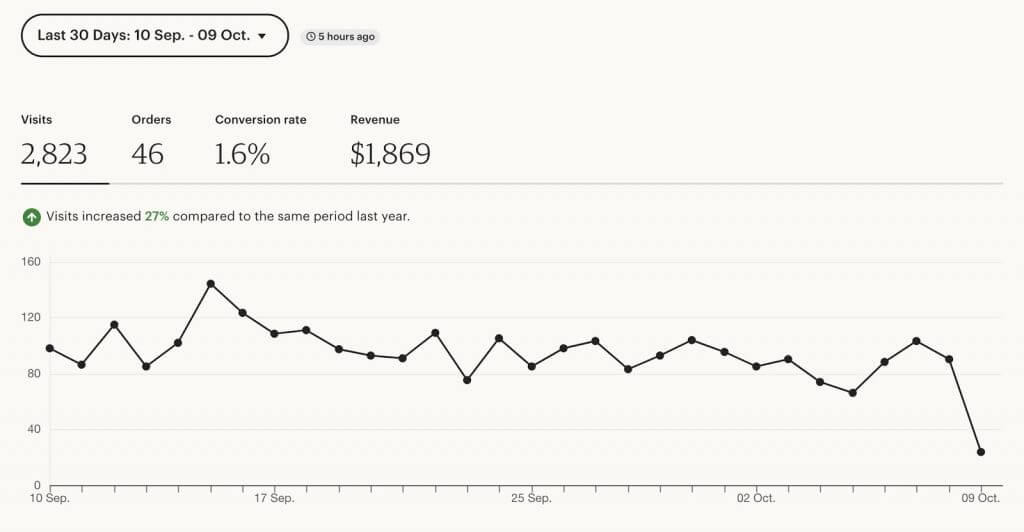
Etsy is another popular e-commerce store that allows users to access a dedicated marketplace to sell their unique products. It has a built-in audience and is a perfect choice for new businesses.
If you are looking for a target to sell your handmade products, this might be the perfect platform for you.
Key Features
- Dedicated marketplace for a niche audience
- Built-in audience
- Able to use listing and product management tools
- Enables international selling
- Offers advertising options to promote listing
- It’s the office resources forums and seller education material
Pros
- Easy access to a targeted audience
- Best platform for sellers who have a unique product
- Simple setup process
- Build marketing and promotions tools
- Seller protection policies to safeguard sellers
Cons
- Transaction fees for each sale
- Limited customization options
- Less control over branding
- High competition
How much does Etsy cost?
Etsy’s pricing includes two main components: listing fees and transaction fees.
- Listing fees: $0.20 per listing, with no limit on the number of listings. Each listing lasts for 4 months before requiring renewal.
- Transaction fee: Approximately 6.5% of the sale, automatically deducted from the seller’s account upon completion of a sale.
Etsy also offers another type of subscription – Etsy Plus.
- Etsy Plus: Optional subscription for $10 per month, offering benefits such as 15 free listing credits, $5 worth of advertising credit monthly, shopping discounts, and analytics tools.
- Additional costs include payment processing fees (e.g., 2.9% + $0.30 per transaction for US cards) and shipping costs incurred by the seller for delivering products to buyers.
Amazon
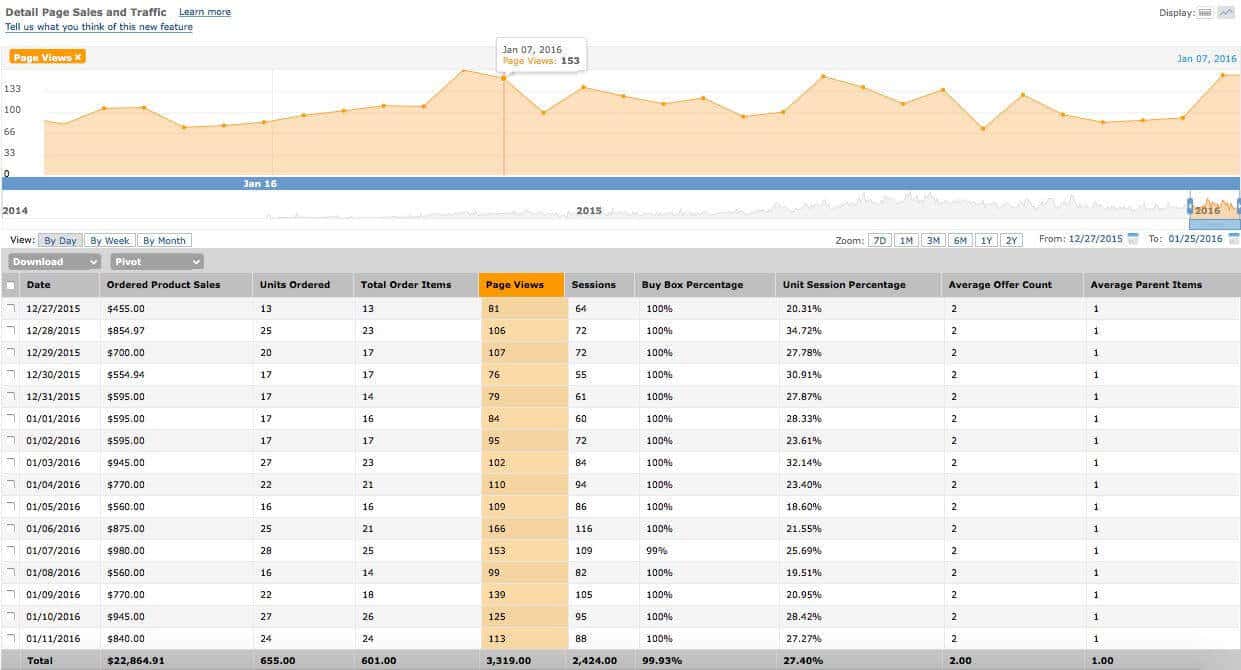
Amazon is one of the largest online marketplaces globally, attracting millions of users daily.
Listing your products on Amazon presents an excellent opportunity to enhance product visibility and drive sales.
Key Features
- Extensive customer base with millions of active users
- Presence in 200+ countries and territories through 18 international marketplaces
- Advertising options include sponsored products, brands, and display ads
- Advanced product listing optimization tools
- Multi-channel fulfillment for storing, packing, and shipping products
- Dynamic pricing strategies and tools
- Prime membership benefits for enhanced customer attraction
Pros
- Vast customer base and global presence
- Trusted and reliable online marketplace
- Trusted by billions of customers
- Enables cross-selling opportunities
- User-friendly seller central dashboard
Cons
- Intense competition among sellers
- Fee structure including referral fees and optional FBA fees
- Stringent policies and guidelines
How much does Amazon cost?
Amazon offers various pricing plans for sellers:
- Individual selling plan: $0.99 per item sold
- Professional selling plan: $39.99 per month
Additional costs may include closing fees starting from $0.50 per item, referral fees ranging between 6% to 20%, and optional FBA fees.
If you’re exploring Gumroad alternatives, numerous exceptional options await.
However, to make an informed decision, it’s crucial to address one important question: How do you select the best alternative for your online business?
Find the right Gumroad alternative for your online business
Now that we’ve explored various Gumroad competitors, how do you decide which one is the best for you?
The answer becomes clearer when you consider the factors most important to your business.
Here’s what to consider when selecting the best Gumroad alternative:
- Product Type: Determine whether you sell digital, physical, or both types of products.
- Pricing Plans: Compare the pricing structures of different Gumroad alternatives to find one that fits your budget.
- Business Objectives: Ensure that the pricing plans align with your business goals and objectives.
- Integration Capabilities: Evaluate how well the alternative integrates with third-party tools and services.
- Payment Methods: Confirm that the platform supports payment methods that meet your customers’ needs and ensure secure transactions.
- User Experience: Look for an intuitive user interface to ensure a smooth transition for your customers.
- Scalability: Check if the alternative can scale with your business as it grows.
Ultimately, selecting the ideal Gumroad alternative hinges on understanding your business requirements.
Hence, invest ample time in researching and comparing various platforms to identify the most suitable one for your needs.
Yet, while exploring Gumroad alternatives, it’s essential to consider tools that can complement and enhance your e-commerce strategy.
Introducing Putler.
Although Putler may not directly substitute Gumroad, it provides invaluable benefits to businesses seeking comprehensive analytics and reporting solutions.
Its distinctive features offer a unique advantage in this regard.
Putler equips you with the tools to maximize your online store’s performance and foster growth.
Let’s delve into why integrating Putler into your toolkit could be the transformative solution your business craves.
Putler: All-in-one solution for reporting and analytics
Putler is a comprehensive analytics solution for eCommerce and SaaS businesses.
It helps you consolidate data of all your stores, payment gateways, and Google Analytics in one place.
It provides powerful insights into your sales, products, subscriptions, customers, web visitors, and more.
Putler helps you to shoot up your e-commerce business with speed, accuracy, and efficiency:
Dedicated dashboards

Putler offers dedicated dashboards for products, customers, sales, transactions, audience, subscriptions, insights, and web analytics.
These dashboards allow you to understand your product performance, top customer segments, sales trends, transaction details, etc.
It has an all-in-one home dashboard that allows you to get a complete overview of your business.
Reports on demand

With Putler, you can get reports on every aspect of your online store, including sales revenue, customer behavior, product performance, etc.
Putler also provides you with a lot of filters that you can use to drill-down into your audience to pick the right reports to export.
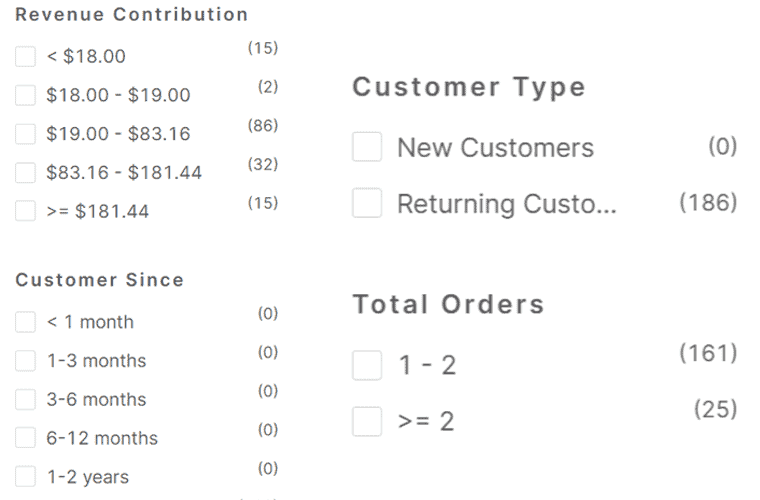
These filters include – customer, quantity sold, average price, refund percent, attributes, location, revenue contribution, and a lot more.
These reports can be used to make informed decisions.
Multi-store management

If you have multiple online stores, Putler can simplify your task and help you get all the details at one centralized platform.
It helps manage your eCommerce stores easily, both comprehensively and individually, and optimize operations.
RFM customer segmentation
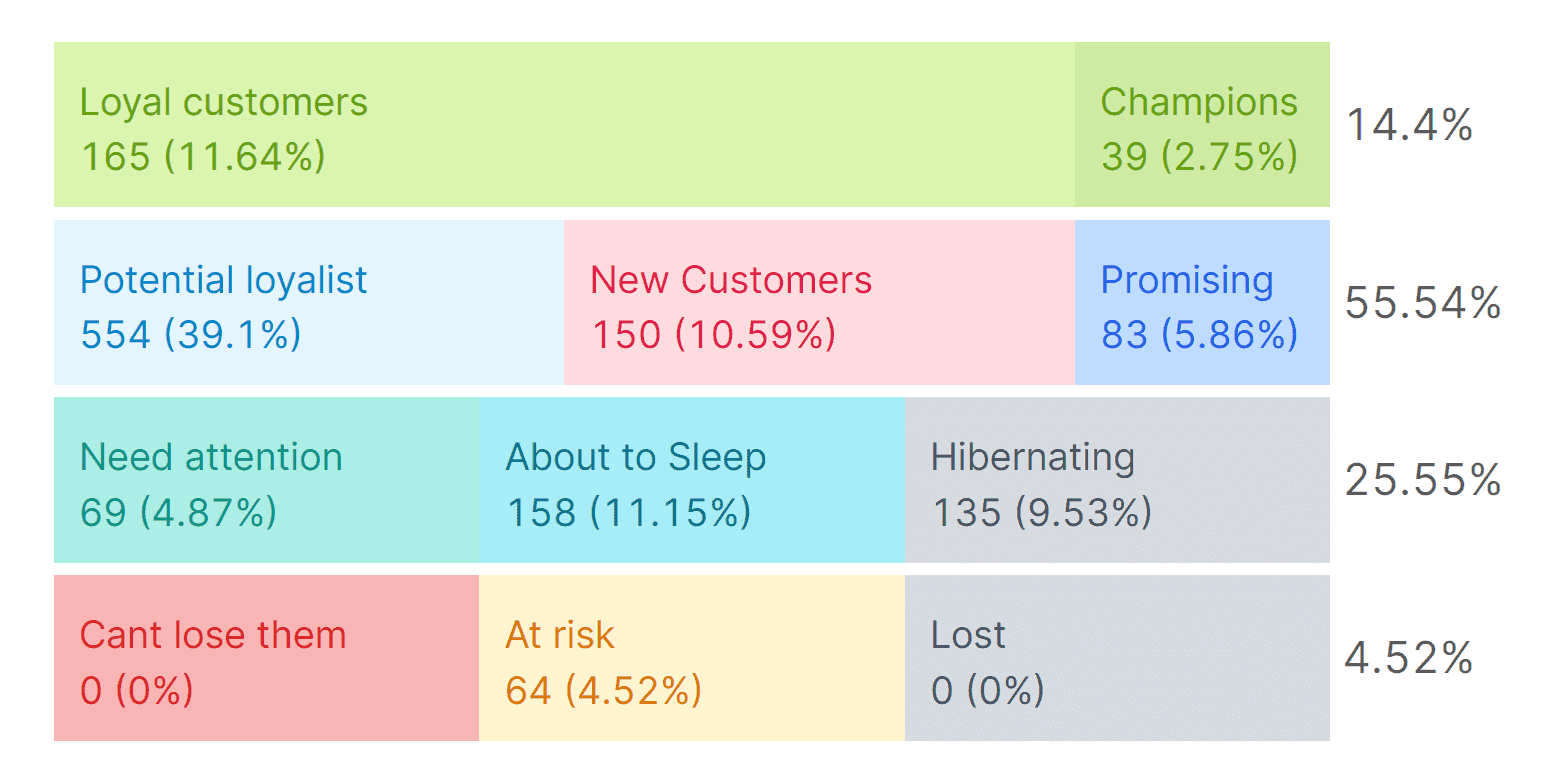
Putler’s RFM customer segmentation categorizes your customers to adapt your marketing and customer service strategies.
It categorizes customers based on their purchase, frequency, and monetary value.
You can identify high-value customers and adapt strategies.
It also helps you to improve engagement, enhance user experience, and nurture long-lasting customer relationships.
Sales heatmap
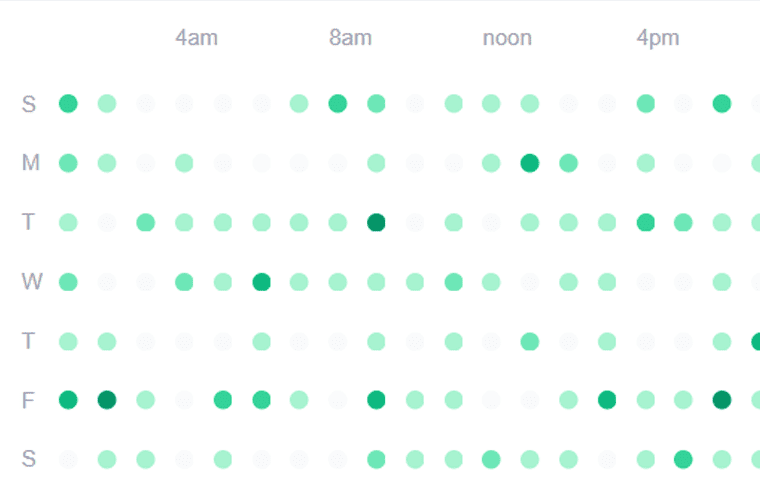
Putler offers a sales heatmap feature that provides a clear understanding of how your business is performing on specific days and times.
It helps you identify when your business experiences the highest and lowest sales. This insight allows you to make data-driven decisions and optimize your e-commerce strategy.
There are so many features that Putler offers to improve your business operations.
Here’s a quick rundown of the other features that Putler offers:
- 36+ Currency Support
- Sales/Revenue Forecasting
- Instant and Secure Refunds
- Products Bought Together
- Activity Log
- Goal Tracking
- Unlimited Team Sharing
- Weekly Email Updates
and, a lot more.
Wish to learn more about Putler, explore it here.
You can also try out the demo dashboard of Putler, here.
Conclusion
Finding the right platform to sell your creations online is crucial for the success of your business.
While Gumroad offers several features and benefits for you, it is better to try other Gumroad competitors if you are planning to upscale your business.
The key is to carefully evaluate your options based on factors like the customization options, pricing integration capabilities, and payment processing.
This helps you shortlist the best fit for yourself.
Also, besides considering Gumroad alternatives, it is important to have a robust analytics tool like Putler by your side to make sure you make informed decisions for your business.
FAQs
What’s better than Gumroad?
Choosing the right platform depends on your business needs and preferences. Gumroad alternatives include Shopify, Bigcommerce, Woocommerce, Etsy, and Amazon.
Each of these platforms has different features so you must align them with your business needs to find the best alternative for yourself.
Also, if you operate on a small scale and sell only digital creations, then switching from Gumroad might not be the best option for you.
What is the alternative to the Gumroad payment?
Several alternative payment processing systems include PayPal, Stripe, Square, and Authorize.Net.
These payment gateways are a secure and reliable way to accept payments from customers worldwide.
While choosing any alternative payment solution, consider factors such as transaction fees, international compatibility, supported payment methods, and integration options with your e-commerce platforms.
